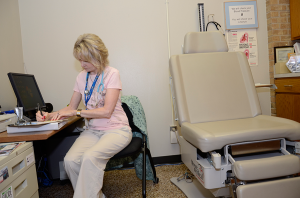
David Reid/The Collegian
By Shirlett Warren/editor-in-chief
When NE Campus opened more than 40 years ago, it had one full-time nurse for approximately 2,000 students.
Today, nearly 17,000 students are enrolled on NE. Still, the campus has only one full-time nurse.
“We’re spread very thin,” said NE coordinator of health services Patricia Marling. “One extra full-time nurse would certainly help.”
In addition to serving as registered nurses, health service coordinators maintain administrative responsibilities including running the educational programs, organizing health fairs, scheduling, ordering supplies and running the department.
“I need help during the day,” Marling said. “If I run a records report on any given day, visits typically peak between 10 [a.m.] and 3 [p.m.]. With so many administrative duties during the day, our office is so busy that we can’t function with one nurse.”
A proposal to hire 55 new staff members including four additional nurses was presented to TCC’s board of trustees Aug. 16. When the 2012-13 budget was approved Aug. 22, it included a provision for 51 new staff members.
“When campus presidents met with the CELT [Chancellor’s Executive Leadership Team], they made decisions on how to distribute funds based upon the presidents’ recommendations,” said associate vice chancellor of finance Nancy Chang.
Only one full-time nurse for NW Campus and one half-time position for SE Campus were approved.
Most campuses have at least one part-time nurse on duty, but those nurses are limited to less than 20 hours a week.
“We’re open seven days a week, 13 hours a day on Monday through Saturday, and five hours on Sunday,” Marling said.
South Campus health services coordinator Tina Ingram said the district offers a pool of on-call nurses who can work on any campus but are typically hired for a specific home campus. However, most on-call nurses work other full-time nursing jobs and tend to only be available evenings and weekends.
NW health services coordinator Thoy Fongsamouth said having an additional nurse devoted to working 40 hours a week would be a benefit. With more than 2,400 visits to the NW health services clinic last year and no part-time nurses on duty, she relies upon on-call nurses to cover staffing needs.
NW currently has four on-call nurses, Fongsamouth said.
“I’m so fortunate to have on-call nurses who want to work, but with an additional full-time nurse, I wouldn’t have to worry about not having coverage,” she said.
The training orientation for a new registered nurse, whether full-time or on-call, is typically two weeks to make sure nurses understand TCC health services’ policies, procedures and guidelines, Fongsamouth said.
“It is important to deliver nursing care safely,” she said.
NE and SE campuses each had more than 4,000 visits to their clinics in the last school year.
“I have a lot of balls in the air,” said SE health services coordinator Elizabeth Lowry.
TR is the only campus that currently staffs two full-time nurses. TR health services coordinator Veronica Warrior and registered nurse Angela Virgin work overlapping shifts during the week.
“We could not keep part-time nurses on staff long enough,” Warrior said. “So I really pushed to get a full-time nurse.”
Virgin, who was hired in June, said she believes she was the first full-time nurse hired in years.
“I find it to be a real benefit,” she said. “We always have coverage.”
Staffing needs go beyond having a person sitting in an office to field phone calls or questions, Marling said.
According to the American College of Health Association, four of the top five impediments to students’ academic performance are health-related: stress, lack of sleep, cold and flu, anxiety and work.
“We have to keep our students in school and not miss classes. If a student twists their knee or is feeling faint, they need to come to the office,” Marling said.
Health services also provides referrals for students and can help them fill out health insurance applications.
“Most students on our campuses don’t have insurance. Sometimes we’re their only line of defense,” she said. “Some students don’t even have money to buy a Zyrtec or a Claritin. We can give them those things for free.”
Plus, visits to campus clinics are not limited to students.
“Twenty-two percent of visits to our office were staff members,” she said. “Some come in to have their blood pressure or glucose checked on a regular basis.”
Warrior said it takes more than one nurse to provide quality care.
“If one person could split herself in four, I’d take her,” she said.




























